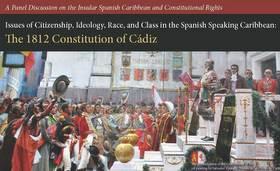
Historian Eric D. Weitz, dean of The City College of New York's Division of Humanities and the Arts, leads a four-member panel discussion March 3 at CCNY on the groundbreaking 1812 Spanish Constitution of Cádiz. The conversation takes place 12 noon – 2 p.m. in the CUNY Dominican Studies Institute (CUNY DSI) Archives and Library, Room 2/202, North Academic Center. The event is free and open to the public; however,registration is required.
The other panelists are:
- Dr. Jorge Chinea, director, Center for Latino/a & Latin American Studies, Wayne State University, Detroit, Mich.;
- Dr. Raul Navarro, researcher at the School of Hispanic-American Studies, Seville, Spain;
- Fidel Tavarez, graduate student, Princeton University, and a 2010 City College graduate.
The Cadiz Constitution, adopted in March 1812, by a national sovereign assembly consisting of representatives from Spain and its colonies, limited for the first time the power of the state and granted certain individual rights and social freedoms to Spaniards. The constitution was extremely influential in the Iberian world, yet historians believe its wider impact has yet to be fully understood.
In their attempt to develop a broader perspective of the document, the four panelists will assess its repercussions in the colonies of Cuba, Puerto Rico and Santo Domingo Español (present day Dominican Republic). They will also gauge its impact on the mentalities of colonial societies and the everyday life of the different racial groups.
More than 200 years after its creation, the Constitution of Cádiz remains pertinent, noted Dr. Ramona Hernandez, director of CUNY DSI and a professor of sociology in City College's Colin Powell School for Civic and Global Leadership. "The issue of citizenship, for instance, is one that's still being debated in former Spanish colonies such as the Dominican Republic."
The talk is presented by CUNY DSI, the Latin American and Latino Studies program and the Department of History.
About The City College of New York
Since 1847, The City College of New York has provided low-cost, high-quality education for New Yorkers in a wide variety of disciplines. More than 16,000 students pursue undergraduate and graduate degrees in: the College of Liberal Arts and Sciences; the Bernard and Anne Spitzer School of Architecture; the School of Education; the Grove School of Engineering; the Sophie Davis School of Biomedical Education, and the Colin Powell School for Civic and Global Leadership. U.S. News, Princeton Review and Forbes all rank City College among the best colleges and universities in the United States.
Historian Eric D. Weitz, dean of The City College of New York's Division of Humanities and the Arts, leads a four-member panel discussion March 3 at CCNY on the groundbreaking 1812 Spanish Constitution of Cádiz. The conversation takes place 12 noon – 2 p.m. in the CUNY Dominican Studies Institute (CUNY DSI) Archives and Library, Room 2/202, North Academic Center. The event is free and open to the public; however,registration is required.
The other panelists are:
- Dr. Jorge Chinea, director, Center for Latino/a & Latin American Studies, Wayne State University, Detroit, Mich.;
- Dr. Raul Navarro, researcher at the School of Hispanic-American Studies, Seville, Spain;
- Fidel Tavarez, graduate student, Princeton University, and a 2010 City College graduate.
The Cadiz Constitution, adopted in March 1812, by a national sovereign assembly consisting of representatives from Spain and its colonies, limited for the first time the power of the state and granted certain individual rights and social freedoms to Spaniards. The constitution was extremely influential in the Iberian world, yet historians believe its wider impact has yet to be fully understood.
In their attempt to develop a broader perspective of the document, the four panelists will assess its repercussions in the colonies of Cuba, Puerto Rico and Santo Domingo Español (present day Dominican Republic). They will also gauge its impact on the mentalities of colonial societies and the everyday life of the different racial groups.
More than 200 years after its creation, the Constitution of Cádiz remains pertinent, noted Dr. Ramona Hernandez, director of CUNY DSI and a professor of sociology in City College's Colin Powell School for Civic and Global Leadership. "The issue of citizenship, for instance, is one that's still being debated in former Spanish colonies such as the Dominican Republic."
The talk is presented by CUNY DSI, the Latin American and Latino Studies program and the Department of History.
About The City College of New York
Since 1847, The City College of New York has provided low-cost, high-quality education for New Yorkers in a wide variety of disciplines. More than 16,000 students pursue undergraduate and graduate degrees in: the College of Liberal Arts and Sciences; the Bernard and Anne Spitzer School of Architecture; the School of Education; the Grove School of Engineering; the Sophie Davis School of Biomedical Education, and the Colin Powell School for Civic and Global Leadership. U.S. News, Princeton Review and Forbes all rank City College among the best colleges and universities in the United States.